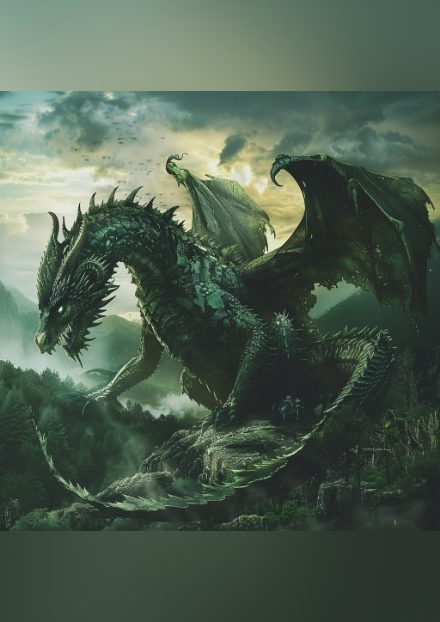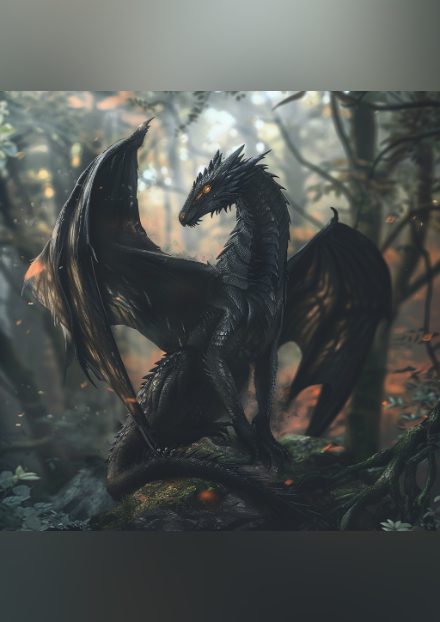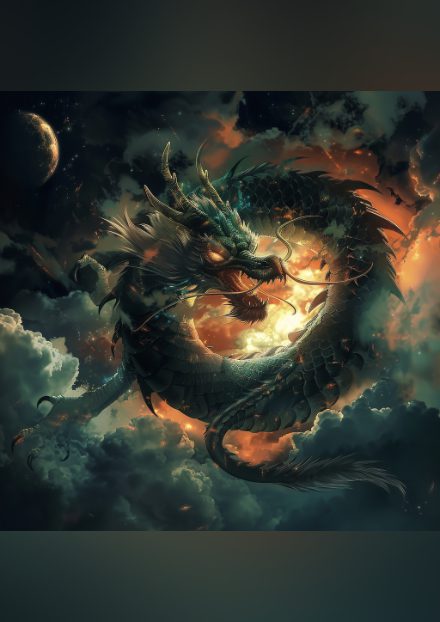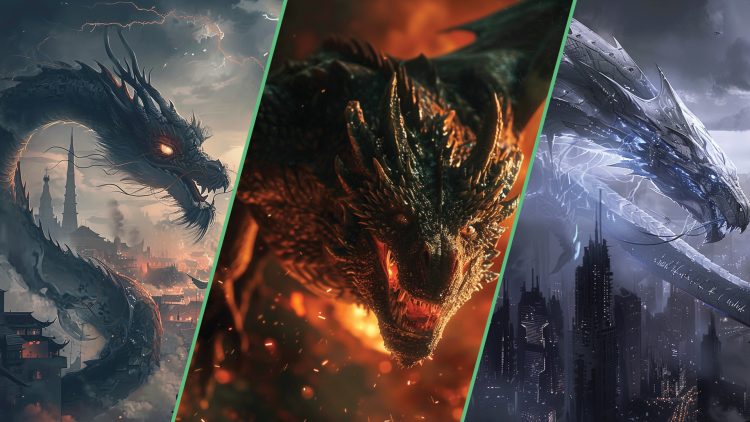This is the Year of the Dragon, a significant event in the Chinese zodiac, providing a mysterious and intriguing backdrop to delve into the history and evolution of these mythical creatures in literature. Dragons have captivated our imagination for all times and have journeyed from Mesopotamia circa 5000 BCE to today’s popular books and series, such as House of the Dragon.
The term ‘dragon’ became English in the 13th century, originating from the Latin ‘dracōnis’ and the Greek ‘drakōns.’ Despite a brief decline in their depiction during the 17th and 18th centuries, we now relish in the mystery and intrigue of these magical beings through various mediums; they are even available in audiobooks and numerous podcasts.
Some recent examples of dragons in literature include Smaug from J.R.R. Tolkien’s The Hobbit and Drogon from George R.R. Martin’s A Song of Ice and Fire series.
Jump to our Dragons Throughout History Infographic
Dragons in Ancient Times

The earliest reference comes from ancient Mesopotamia, featuring the Mušḫuššu, a dragon with a unique set of characteristics. It had a scaly exterior, hind legs resembling an eagle’s talons, feline forelegs, a long neck and tail, a horned head, a snake-like tongue, and a crest.
Other ancient dragons include Ušumgal, the dragon Apep, the depiction of order vs chaos, and Outoboros from Egyptian mythology seen between 2190 and 2165 BC. There is even Leviathan, a dragon, written in Job 41:1-34 in the Hebrew Bible.
According to Hesiod’s Theogony, the first written appearance of a dragon was the Hydra in Greek mythology. She was the child of Echidna and Typhon, two of mythology’s most feared monsters, and joined the list as one of Hercules’ twelve tasks to complete.
Ladon and Python were also the monsters that symbolized various aspects of chaos, guardianship, and divine conflict in the epic poems The Iliad and The Odyssey.
RelatedDragons In Literature: Everything You’ve Ever Wanted To Know
Dragons From the 5th to the 15th Centuries CE

Dragons played a pivotal role in shaping the worldview of medieval Europe. Initially depicted as fearsome creatures guarding treasure, they were prominent in stories like Beowulf and Arthurian legends. From being viewed as villains, they evolved into invaluable allies, providing crucial guidance to the characters in the story. They adorned soldiers’ uniforms heading to war and featured in tapestries and other art forms.
The concept of the dragons of this period has significantly influenced popular culture and continued to do so during the Renaissance, representing chaos, temptation, and the unknown. They were featured in works like Edmund Spenser’s The Faerie Queene and John Milton’s Paradise Lost, leaving an indelible mark on the society of that time.
Dragons in the 17th and 18th Centuries CE

The Enlightenment Era brought about a decline in beliefs surrounding mythical creatures. This was due to the rise of scientific reasoning. However, dragons did not wholly disappear; they continued to exist in literature as symbolic figures.
Then came the 19th century with Romanticism and Victorian literature and the renewal of interest in mythical creatures, including dragons, since authors were drawn to the themes of imagination, the supernatural, and the unknown. We see this in J.R.R. Tolkien’s The Hobbit and Grimms Faerie Tales.
Dragons in Chinese Culture

Before moving on to the last two centuries, let’s pause at this year, the Year of the Dragon; in Chinese mythology and culture, dragons hold a revered status and have done so since 5000 BCE. Unlike their depiction in other cultures, dragons are still indispensable and respected in Chinese culture, as they symbolize auspiciousness, prosperity, wisdom, courage, unity, and national identity.
They are revered as benevolent beings and associated with the emperor and the imperial family.
Dragon symbolism is pervasive in Chinese culture, from ancient paintings and sculptures to modern media, serving as a significant source of artistic inspiration. The dragon is not just a symbol of Chinese culture. It also represents its people’s creative and spiritual aspirations, commanding respect and admiration.
RelatedDifferences Between Horror and Dark Fantasy: An Exploration
Dragons in Other Cultures

Dragons are significant in Japanese culture and literature, as seen in popular anime shows such as Dragon Ball and One Piece. In Japan, dragons are known as “Ryū” and are symbols of power, wisdom, and good fortune.
They serve as protectors of Buddha and, like China, are associated with the emperor. In Japanese mythology, dragons can even take human form to procreate. Moreover, dragons in Japan hold a precious stone or pearl in their claw, which represents victory.
Although not as elaborate as Asian and European dragons, North and South American dragons are also part of culture and literature. In North America, they are worshipped as God-like figures, sometimes covered in feathers, while in South America, they possess unique physical properties and can shapeshift.
Related10 Most Popular Fantasy Books of All Time
Dragons Today and Tomorrow

Finally, the 20th and 21st centuries have seen a resurgence in popularity with the increasing fame of fantasy literature; J.R.R. Tolkien’s Middle-Earth and J.K. Rowling’s Wizarding World have brought dragons to the forefront of many epic books, movies, and series. Dragons have been fascinating and captivating creatures that have fascinated all of us and will continue to do so for a long time.
Dragons Throughout History Infographic















